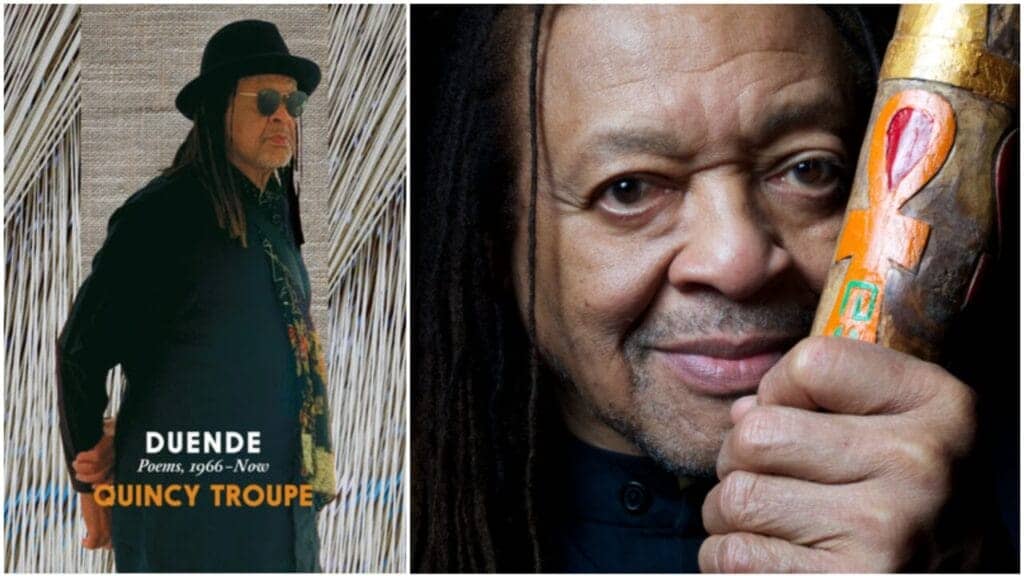
by Martina McGowan
Duende is a term first coined by famous playwright Federico García Lorca. It is a concept representing a “dark and elusive force through which artists have the ability to channel their creative power.”
This new compilation of Quincy Troupe’s work contains many new works, 2019-2020, as well as selected poems from his previous 11 volumes.
Throughout this volume, Troupe explores many recurrent topics and themes like language, poetry, extended family, street life, nature and beauty – “Eye listen to nature’s orchestra … perfect pitch / perfect rhythm.”
Other topics include the environment, climate change – head in the sand climate deniers – places and people, politics new and historical – think Trump, Watts 1965.
Quincy Troupe’s writing across the span of his 50-year career has an overarching lyrical and musical quality. He obscures the distinction between poetry and music.
Reading through Quincy Troupe’s five decades of poetry is like listening to your favorite jazz musicians like John Coltrane, Sun Ra and of course, his friend Miles Davis to name a few.
Just as you think you’ve caught one beat or hook of a melody and settle in, he moves in a different direction, a tangential line; each more colorful than the last, with more depth and more truth. He writes like the heartbeat of the earth speaking to our hearts.
In “Embryo,” he speaks of “poetry in birth of motion.” He deftly displays the music to be found, even when talking about such mundane issues as a “grave-diggers strike.” He pushes us toward deeper, more insightful thinking, exploring the inner landscape of “what we make of life.”
The collection contains powerful poems for fallen youth – Michael Brown, Tamir Rice, Trayvon Martin, Elijah Eugene Cummings.
Troupe invites us to walk alongside the everyday lives of people who carry “pain wrapped as a shawl.” He uses his trademark of writing “eye” instead of “I,” showing us that he is serving as witness to life, all the while “bluesing … language,” and taking “us back to where music began.”
Besides the many musicians, Troupe lavishes love on many of our sports heroes: Magic Johnson, Julius Erving, Kobe Bryant, Michael Jordan, Sammy Sosa and Mark McGwire.
He writes with honesty, longing and uninhibited phraseology, making exquisite use of internal and slant rhymes that keeps us invested. “Roll it back, kojak.” But he does not eschew form – mixing in sonnets, villanelles and sestinas, bathing us in the “subliminal seduction of sentences, where language can become anything.”
He pays tribute to literary icons like Lucille Clifton and Toni Morrison. And like Morrison, Troupe finds that “magic comes when you least expect it.” Troupe writes poetry with eloquence and deep understanding mixed with wonder.
In “Ghost Voices,” he writes about Leontyne Price, “soaring sonic hoodoo … breaking barriers”; while he himself simultaneously displays a desire to reconnect with the past, while also longing to be released from the power and shadow of it in his writing.
The collection contains powerful poems for fallen youth – Michael Brown, Tamir Rice, Trayvon Martin, Elijah McClain.
From the final section, “New Poems, 2019-2020,” the title poem “Duende” speaks of its namesake’s “bottomless power.” Power “rising from the holy ghost lost in bloody homelands … vibrating a new … andante blues.”
Quincy Troupe is one of the witnesses and truth-bearers of our nation’s history, told in the musical flow and rhythm of poetry. This is the work of poets that will help carry us through to the end.
There are so many more poems in this volume I have yet to read. I will return to this book often as there is something in his words for me every time.
African American physician Martina McGowan is a poet, writer, artist, advocate and activist in the wars against social, racial and sexual injustices. She is the author of “i am the rage,” published by SourceBooks, 2021. “i am the rage” was the 2021 International Book Award winner in the Social Change category. Her work has been published in several literary magazines and anthologies.

 Store
Store


